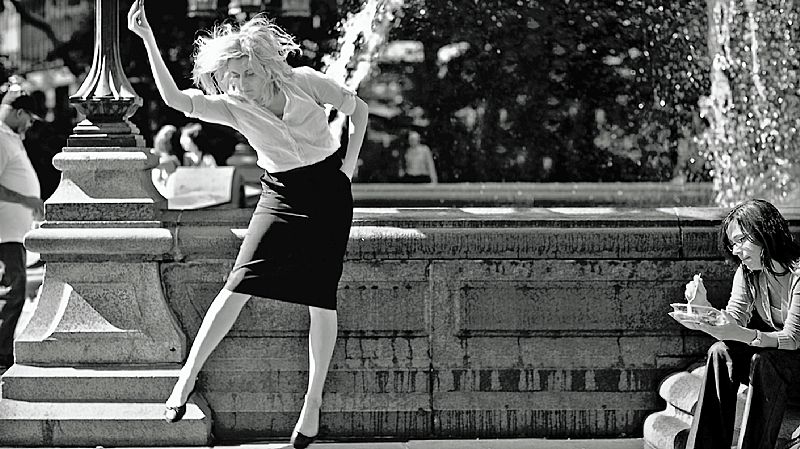
If you had previously asked me what you would get if you removed all of the misogyny from Woody Allen’s films, I would have guessed Diane Keaton saying “la di da” in a tie. But, thankfully, I was wrong: you get Frances Ha. While attempting to pinpoint the origin of my current obsession with this Noah Baumbach/Greta Gerwig creation, I came up with the following possibilities: perhaps it’s because the film perfectly captures that particular brand of depression that arises when you return to your college campus as an adult and pretend not to be that much older than the undergraduates, only to realize that you are SO much older than the undergraduates. Perhaps it’s because so many white finance guys are EXACTLY like that (i.e., nice enough, but you know they’ll sleep with your babysitter one day). Perhaps it’s because the film recognizes that, yes, at some point you have to get a real job involving far too many spreadsheets. But, more than anything, it’s because Frances Ha is a comedy about a woman that isn’t concerned with her relationship status. So Frances Ha doesn’t just pass the Bechdel Test. It basically IS the Bechdel Test.It’s impossible to discuss Frances Ha without mentioning Girls—and not just because Adam Driver plays a Brooklyn-based “artist?” in both. When Frances and Sophie (Mickey Sumner) are sleeping in Sophie’s bed and remarking on their fairly unremarkable boyfriends, I immediately thought of Hannah and Marnie sharing a bath in the Girls pilot—a scene which epitomized the weirdly intimate nature of female friendships. The difference here is that Marnie and Hannah were 23; Frances and Sophie are 27. Although we’re only talking about the difference of four years, what is acceptable in your early twenties and what is acceptable in your later twenties are two very different things. It’s fine for Marnie and Hannah to be the most significant people in each other’s lives, but it’s weird that Frances uses Sophie as an excuse not to move in with her boyfriend. When Sophie asks Frances, “We’re still doing this?”, what she’s really saying is, “what we have here is a dead shark.” And we all know what that means.
Despite its new wave trappings, Frances Ha is structured like a traditional romantic comedy. We have a break up, resulting comedic high jinks, and ultimate growth. But there are a few key differences: (1) the pivotal breakup involves two heterosexual women; (2) Frances encounters no adorable male sidekick whom she unknowingly falls in love with while trying to win back Sophie, and (3) she manages to achieve a modicum of growth and happiness while remaining single. Also, no one seems to recognize that Frances is in the middle of a romantic comedy. This isn’t surprising because few people really care when a platonic friend dumps you. The lack of genital contact somehow renders the relationship inconsequential, but the loss is sometimes even worse because you expect boyfriends and girlfriends to break your heart, not your best friend.
Frances, therefore, has no language to express her pain, so she becomes increasingly childish—especially toward Sophie’s fiancé. Patch may look like a bro and talk like a bro, but he treats Sophie (and Frances) kindly—and always seems to pick up the tab. So Frances’s rudeness toward him is just petty. Frances responds to their engagement by stalking Sophie online, calling her “my Sophie” when another woman dares to mentions her, and finally lying to Sophie about her own life. While on an ill-advised trip to Paris involving missed calls and a lot of sleeping, Frances tells Sophie that her life is just swell. She admits that she loves Sophie, but she can’t admit that she’s a mess. And it turns out that Sophie is lying as well. Even though her blog may include happy photos documenting her Japanese adventures, she has given up her career to move across the world with a man named Patch. Nothing good can come of that.
Like far too many things in life, this once again made me think of Girls. One of last season’s better scenes was the awkward phone call between Hannah and Marnie where neither girl could admit that she was spiraling. Similarly, neither Sophie nor Frances wants to admit that being an adult kind of sucks and that they aren’t doing so well at it. It’s only after Sophie and Frances both break down and stop pretending that their friendship heals. But it doesn’t go back to the way it was before because it can’t and it shouldn’t. It heals because Frances finally realizes that she no longer needs Sophie to live. She just needs a pair of shoes.
And in the end, Frances becomes the stronger of the two women. Although there are scenes of affection between Sophie and Patch, it’s clear that they have nothing in common and likely wouldn’t be getting married if he weren’t an analyst at Goldman. Sophie is going to be able to have a creative life in NYC because someone else is footing the bill. And good for her. But Frances doesn’t have that option. She’s given up the fairytale of what her life will be like and is instead actually pretending to be an adult.
Some might argue that the film’s ending is too happy or too neat, to which I’d respond: shut the fuck up. First of all, I kind of like neat romantic comedy endings. If it’s good enough for Shakespeare, it’s good enough for me. And, second, it’s not as though Frances’s life is suddenly perfect. She’s a single 28-year-old, getting paid little to work in an office so she can be creative on the side while living alone in a studio. Awesome? But she’s getting her shit together, and that’s the point. There’s only one name on her mailbox, but, for now, that one name is more than enough.


A good read. Didn’t feel like I needed to have watched “Girls” to take home the meanings of the comparisons.